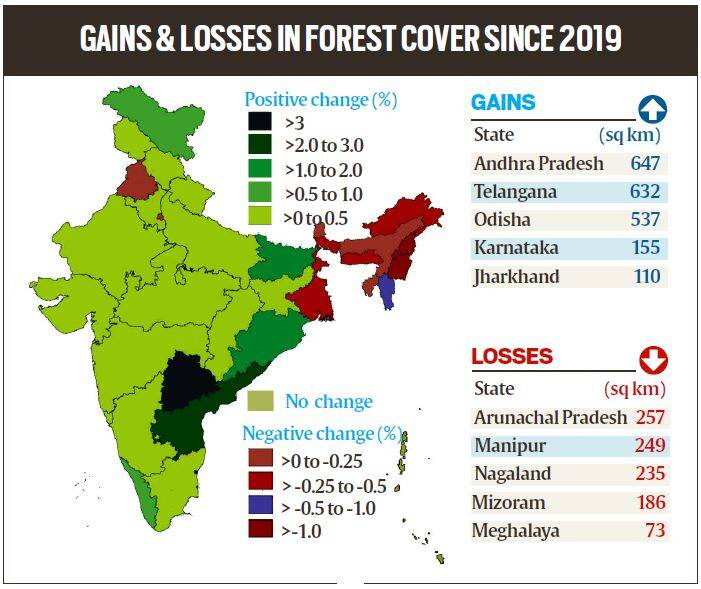Ahmedabad
(Head Office)Address : 506, 3rd EYE THREE (III), Opp. Induben Khakhrawala, Girish Cold Drink Cross Road, CG Road, Navrangpura, Ahmedabad, 380009.
Mobile : 8469231587 / 9586028957
Telephone : 079-40098991
E-mail: dics.upsc@gmail.com

Forest Cover in India
News: The recently released India State of Forest Report (ISFR) 2021 shows the total forest and tree cover in India is 80.9 million hectares, which is 24.62 per cent of the geographical area of the country.
Definition:
• India’s definition of forest cover is in sync with that of the Kyoto Protocol.A “forest” has a minimum area of 0.05 to 1 ha (India has 1.0 ha minimum), with the tree crown cover percentage being more than 10 to 30 per cent (India has 10 per cent) and with trees having the potential to reach a minimum height of 2 to 5 m at maturity in situ (in India, it’s 2 m).The definition thus arrived at by India assesses forests as all lands, more than 1 hectare in area, with a tree canopy density of more than 10 per cent irrespective of ownership and legal status.Such lands may not necessarily be a recorded forest area.It also includes orchards, bamboo, palm etc.
Assessment:
• The assessment of forest cover is done based on the interpretation of satellite data, which basically identifies umbrella-shaped canopies from the sky.The forest cover is also estimated from field inventory data, which corroborates the figures of forest cover obtained from the satellite-based interpretation.
• The environment ministry is even considering providing forest cover maps through the Web Map Service to make the analyses of researchers and agencies easier.
• Importance of plantations: The importance of plantations needs to be understood.
• For example, cashew plantations, which mainly grow along the coast, serve as the first line of defence against cyclones, which are hitting with greater frequency and ferocity.
• Mixed plantations, especially of native species, meet all the ecological functions of natural forests.
• A lot of wildlife inhabits these plantations.While we do not advocate equating natural forests with plantations, let us recognise their ecological functions.
Efforts:
• India is on track to achieve its national commitment to land degradation neutrality.India is working towards restoring 26 million hectares of degraded land by 2030.Our afforestation efforts are also aligned with our wildlife conservation efforts.Project Tiger was launched in 1973.
• From nine tiger reserves initially, we now have 51 tiger reserves.These are the cornerstones of wildlife conservation and preserve natural ecosystems which support ecological processes responsible for providing various goods and services that are vital for human well-being.
Way forward
• Notwithstanding these gains, the goal of 33 per cent area under forest and tree cover as per the National Forest Policy, 1988, remains to be achieved.
• The balance of 9 per cent can be achieved through taking up plantation/afforestation outside the forests and restocking/plantation in degraded and scrub forests.According to the ISFR 2021, the Trees outside forest (TOF) extent comprises 36.18 per cent of the total forest and tree cover of the country.Giventhis fact, the draft NFP 2021 has focused on the promotion of TOF by including it among its objectives.
• Given this fact, the draft NFP 2021 has focused on the promotion of TOF by including it among its objectives.
• The provisions in draft NFP 2021 include substantially increasing the tree cover outside forests by incentivising and promoting agro-forestry and farm forestry; managing and expanding green spaces in urban and peri-urban areas to enhance citizens’ well-being; plantation of trees outside forests in partnership with local communities, land-owning agencies, and private enterprises; creation, sustainable management and promotion of urban forests; afforestation/reforestation in public-private partnership (PPP) mode; promotion of urban forests.

Address : 506, 3rd EYE THREE (III), Opp. Induben Khakhrawala, Girish Cold Drink Cross Road, CG Road, Navrangpura, Ahmedabad, 380009.
Mobile : 8469231587 / 9586028957
Telephone : 079-40098991
E-mail: dics.upsc@gmail.com
Address: A-306, The Landmark, Urjanagar-1, Opp. Spicy Street, Kudasan – Por Road, Kudasan, Gandhinagar – 382421
Mobile : 9723832444 / 9723932444
E-mail: dics.gnagar@gmail.com
Address: 2nd Floor, 9 Shivali Society, L&T Circle, opp. Ratri Bazar, Karelibaugh, Vadodara, 390018
Mobile : 9725692037 / 9725692054
E-mail: dics.vadodara@gmail.com
Address: 403, Raj Victoria, Opp. Pal Walkway, Near Galaxy Circle, Pal, Surat-394510
Mobile : 8401031583 / 8401031587
E-mail: dics.surat@gmail.com
Address: 303,305 K 158 Complex Above Magson, Sindhubhavan Road Ahmedabad-380059
Mobile : 9974751177 / 8469231587
E-mail: dicssbr@gmail.com
Address: 57/17, 2nd Floor, Old Rajinder Nagar Market, Bada Bazaar Marg, Delhi-60
Mobile : 9104830862 / 9104830865
E-mail: dics.newdelhi@gmail.com